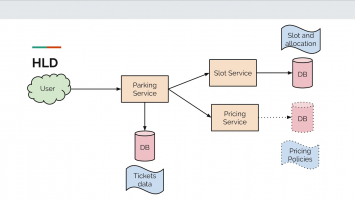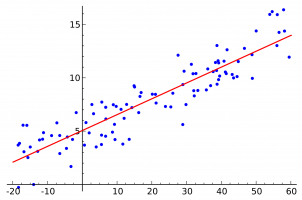Top 8 Best Online Game Theory Courses
Game theory is a mathematical theory about deciding what will bring the maximum benefit to oneself based on what others will do. Using the basic concepts from ... read more...traditional games, such as chess and poker, the subject is a mixture of many different subjects, such as mathematics, economics, and even psychology. Beyond games, the subject is used not only in an individual’s daily decisions, but also in international diplomacy, political campaigns, and trade. Here are some best online game theory courses listed by Toplist.
-
Game theory is a theoretical framework for imagining social scenarios in which competitive players interact. Game theory is, in some ways, the study of strategy, or at least the optimum decision-making of independent and competing agents in a strategic situation. Game theory is a theoretical framework for imagining social scenarios between competing individuals and producing optimum decision-making among autonomous and competing agents in a strategic environment. Real-world scenarios for circumstances such as pricing competition and product releases (among many others) may be sketched out and their consequences anticipated using game theory. Among the various scenarios are the prisoner's dilemma and the dictator game.
Game Theory Fundamentals: The game, which serves as a model of an interaction scenario among rational participants, is at the center of game theory. The essential concept in game theory is that one player's payout is dependent on the strategy used by the other player. The game determines the identities, preferences, and available strategies of the players, as well as how these strategies affect the outcome. Depending on the model, additional needs or assumptions may be required. Psychology, evolutionary biology, the military, politics, economics, and business are all areas where game theory may be used. Despite its numerous breakthroughs, game theory is a young and evolving field.
Who is this course for?
- Any one who wishes to learn decision-making using logical reasoning and market analysis through systematic calculations.
Requirements:
- No prerequisites as such because the instructor has taught the entire concept from scratch and it is a skill which everyone should learn and implement. Even the smallest of startups and entrepreneurs would benefit if they knew game theory and knew how different firms react and cheat to capture the market.
Udemy rating: 5/5
Enroll here: https://www.udemy.com/course/gametheoryandapplications/

https://www.udemy.com/ 
https://www.udemy.com/ -
This course gives an overview of game theory. Their primary objective is to comprehend the fundamental notions behind essential concepts in game theory, such as equilibrium, rationality, and cooperation. The course employs very little mathematics and is excellent for individuals seeking a conceptual introduction to game theory.
Business competition, political campaigns, animal and plant survival, and so on may all be viewed as a type of "game" in which individuals compete to perform their best against others. Game theory provides a broad framework for describing and analyzing how people act in "strategic" circumstances. This course focuses on major topics in game theory and seeks to describe the informal fundamental principles that are frequently obscured by mathematical formulations. Economic theory, political science, psychology, sociology, biology, and computer science are just a few of the fields where game theory has been used. As a result, audiences from various areas who are interested in learning more about game theory are warmly welcomed.
Michihiro Kandori received his Ph.D. in Economics from Stanford University in 1989. He worked as an Assistant Professor at the University of Pennsylvania from 1989 and at Princeton University from 1990, before he joined the Faculty of Economics at the University of Tokyo in 1992. Currently, he is a university professor at the University of Tokyo. Professor Kandori is a Fellow of the Econometric Society and the Game Theory Society. His seminal papers about social norms (1992) and evolutionary game theory (1993) together have received more than 4,000 citations to date, according to Google Scholar.
This course offers
- Flexible deadlines
- Shareable Certificate
- 100% online
- Beginner Level
- Approx. 21 hours to complete
- Subtitles: Arabic, French, Portuguese (European), Italian, Vietnamese, German, Russian, English, Spanish
Coursera rating: 4.7/5
Enroll here: https://www.coursera.org/learn/game-theory-introduction

https://www.coursera.org/ 
https://www.coursera.org/ -
Game theory, made popular by films such as "A Beautiful Mind," is the mathematical description of strategic interaction among rational (and irrational) actors. This advanced course examines how to design interactions between actors in order to produce desirable social outcomes throughout four weeks of lectures. The course covers three major topics: social choice theory (collective decision making and voting systems), mechanism design, and auctions.
In the first week, they look at the difficulty of aggregating diverse agents' preferences, as well as voting procedures and the difficulties associated with collective decision making. They cover some of the most significant theoretical conclusions in the field, including Arrow's Theorem, which establishes that no voting system is "perfect," as well as the Gibbard-Satterthwaite and Muller-Satterthwaite Theorems. They then look at how to make collective judgments when actors are self-interested and can strategically misreport their preferences. They define "mechanism design," a comprehensive framework for engineering interactions between self-interested agents, and provide some fundamental theoretical findings. Their third week focuses on the topic of developing mechanisms to optimize aggregate pleasure across agents and introduces the strong Vickrey-Clarke-Groves family of mechanisms. The course concludes with a fourth week that looks at the challenge of allocating finite resources among self-interested actors and introduces them to auction theory.
This course offers
- Flexible deadlines
- Shareable Certificate
- 100% online
- Advanced Level
- It takes approximately 17 hours to complete.
- Subtitles: French, Portuguese (European), Chinese (Simplified), Russian, English, Spanish
Coursera rating: 4.7/5
Enroll here: https://www.coursera.org/learn/game-theory-2
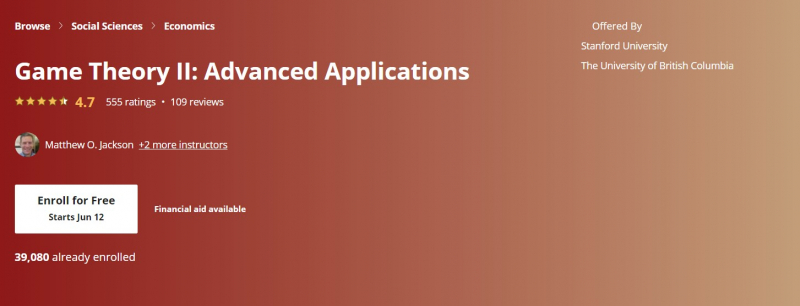
https://www.coursera.org/ 
https://www.coursera.org/ -
This course explains the fundamental ideas of non-cooperative game theory using a hands-on method, which includes presenting, discussing, and solving situations. Matching pennies, the prisoners' dilemma, the battle of the sexes, and the game of chicken will be examined in order to introduce and apply ideas such as Nash equilibrium in pure and mixed strategies, the removal of dominated strategies, and recurrent games. Sequential games will also be discussed in detail, employing a structure based on game trees. As a result, the concept of subgame perfect equilibrium will be addressed. Finally, certain game theory principles will be applied to characterize the conclusion of the Cournot and Stackelberg duopoly, as well as the instability of a cartel.
In this course, you will learn the main concepts in non-cooperative game theory and how to use them to find equilibria for actual games. You will get to know some classic battle horse games very well, such as matching pennies, the prisoners' dilemma, the battle of sexes, and the game of chicken. You will learn to use equilibrium concepts such as those of Nash equilibrium and subgame perfect equilibrium for sequential games. You will be asked to make comparisons between game-theoretic concepts and some market forms. You will be asked to apply the concepts learned in class to some end-of-class exercises. This is one of the best online game theory courses.
Who is this course for?
- first and second-year students in Economics (Major and Minor).
- Students in the social sciences, wishing to get basic hands-on notions of non-cooperative game theory,
- Managers wish to get some insight into game theoretical concepts and learn to think more strategically.
Requirements:
- For most of the course, simple algebra and very basic notions of calculus are sufficient for some applications.
- very basic notions of statistics (in particular, the concept of a weighted average).
Udemy rating: 4.4/5.
Enroll here: https://www.udemy.com/course/hands-on-microeconomics-a-primer-in-game-theory/
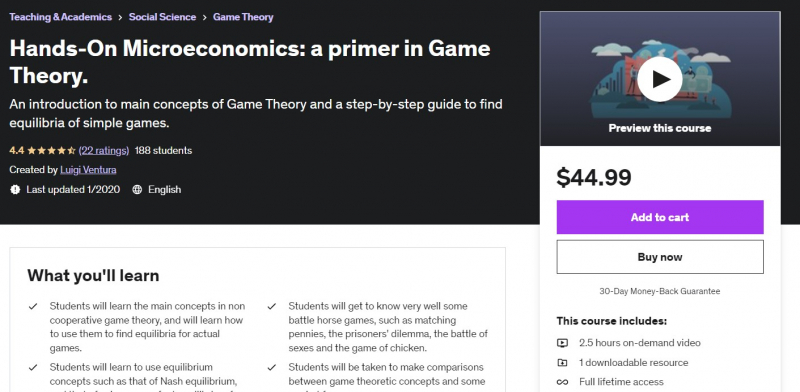
https://www.udemy.com/ 
https://www.udemy.com/ -
Since its emergence in the mid-twentieth century, contemporary game theory—the scientific study of interactive, rational decision-making—has been crucial in helping us understand how and why humans make decisions. Game theory is significant in our lives because it gives surprising insights into all undertakings in which humans collaborate or compete, such as biology, computer science, politics, agriculture, and, most crucially, economics. You can even see game theory at work in the interactions you engage in every day, such as an obvious "game," like buying a car, or a less obvious one, like trying to decide where to go on a Saturday night or how you ought to dress.
A simple understanding of this vital tool may help us cut through an often bewildering flood of information, helping us to make better decisions in our own lives or better appreciate the options faced by other players in games. Games People Play: Game Theory in Life, Business, and Beyond is a course established by James Madison University's award-winning Professor Scott P. Stevens for anybody interested in learning about game theory. He covers the principles of game theory in 24 incisive lectures that are both interesting and easy to grasp. This is one of the best online game theory courses.
This course offers
- Download 24 video lectures to your computer or mobile app.
- A Downloadable PDF of the course guidebook
- FREE video streaming of the course from their website and mobile apps!
- 24 lectures on 4 DVDs
- 124-page printed course guidebook
- Downloadable PDF of the course guidebook
- FREE video streaming of the course from their website and mobile apps
The Great Courses rating: 4.4/5
Enroll here: https://www.thegreatcourses.com/courses/games-people-play-game-theory-in-life-business-and-beyond

https://www.thegreatcourses.com/ 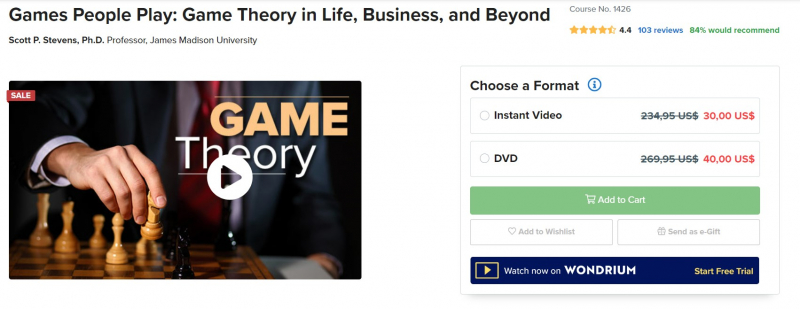
https://www.thegreatcourses.com/ -
This 2-hour project-based course will teach you the game theoretic principles of two-player static and dynamic games; pure and mixed strategy Nash Equilibria for static games (illustrations with unique and numerous solutions); and an example of an Axelrod tournament. You will create two-player Nash games and analyze them using the Python packages Nashpy and Axelrod, which are specifically designed for game theoretic studies. You will also get a knowledge of the computational methods associated with the aforementioned notions.
Note: This course works best for learners who are based in the North America region. We’re currently working on providing the same experience in other regions.
In a video that plays in a split-screen with your work area, your instructor will walk you through these steps:
- Two-player Static Games
- Mixed Strategies and Utilities
- Pure Strategy, Nash Equilibrium
- Multiple Nash Equilibria
- Zero Sum Games and Mixed Strategies
- Two-player Dynamic Games
- An Analysis of Dynamic Games
Barsha Saha is a PhD Scholar working in the area of IO (Industrial Organization) and Game Theory. She is an Electronics and Instrumentation Engineer with a professional experience as an SAP Consultant. Her courses/guided projects are designed as a blend of theoretical concepts and hands-on application of various Statistical analyses.
This course offers
- two hours
- Intermediate
- No download needed.
- Split-screen video
- English
- Desktop only
Coursera rating: 4.3/5
Enroll here: https://www.coursera.org/projects/game-theory-with-python
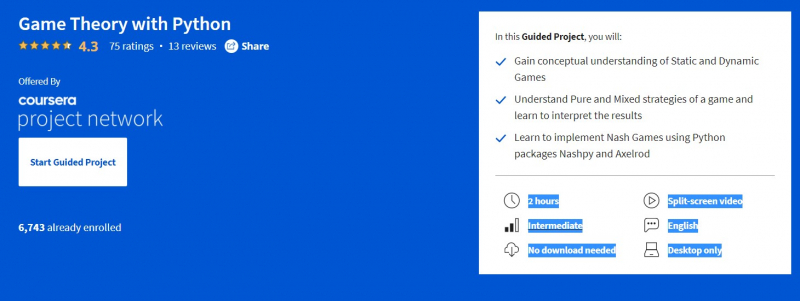
https://www.coursera.org/ 
https://www.coursera.org/ -
They've previously published four courses in the "Operations Research" series, which have gotten positive feedback from students all around the world. Encouraged by the positive reaction, they considered creating a new course on Game Theory, a well-known topic in Operations Research. When the payoffs are fully known to either party, it is basically a situation of two competing participants playing a "game" with each other. Both participants are presumed to be sensible, which means they will not do anything that would do them harm.
The course will cover the fundamentals of game theory. The fundamental ideas, such as games with and without saddle points, are discussed. Pure strategy games versus hybrid strategy games Simple methods for solving two-by-two games have been discussed. Following that, the "Rule of Dominance" was discussed, with the goal of reducing the size of the game whenever feasible. The modified rule of dominance has also been discussed. A graphical solution to the game theory problem is conceivable if the game can be simplified to a two-row or two-column game. This course covers problems from each category (one of each). In some cases, the system of oddments is best suited to three-by-three games that cannot otherwise be reduced to a lower size. Two problems in the technique of oddments were addressed in the course. Finally, and most significantly, This is one of the best online game theory courses.
Who this course is for:
- Students undertaking MBA, MS (in Management Sciences), those studying for BBA, CPA, Chartered Accountancy, Engineering, Technology, and similar
Requirements:
- You just need to know school-level maths and have a good internet connection.
Udemy rating: 4.3/5
Enroll here: https://www.udemy.com/course/operations-research-game-theory/
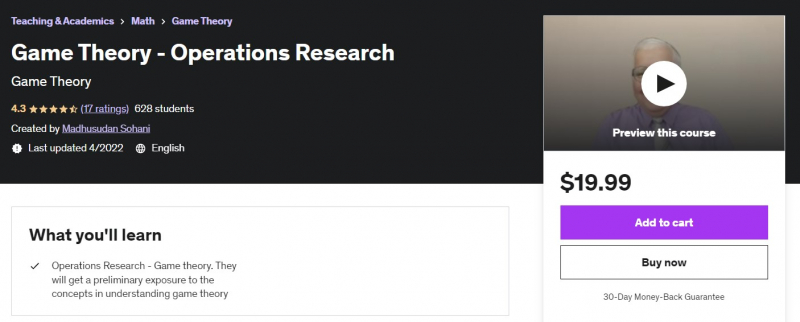
https://www.udemy.com/ 
https://www.udemy.com/ -
Game theory, made popular by films such as "A Beautiful Mind," is the mathematical description of strategic interaction among rational (and irrational) actors. It involves the modeling of conflict among nations, political campaigns, rivalry among corporations, and trading activity in markets such as the NYSE, in addition to what they term "games" in common parlance. How could you begin to model keyword auctions and peer-to-peer file-sharing networks without taking into consideration the motivations of those who use them? The course will cover the fundamentals of describing games and tactics, the extended form (also known as game trees by computer scientists), Bayesian games (which mimic things like auctions), repetitive and stochastic games, and more. They'll provide a range of examples, such as classic games and a few new applications.
Your instructor, Yoav Shoham received his PhD in computer science from Yale University in 1987 and has been a Professor of Computer Science at Stanford University since then. His research interests include logic-based knowledge representation, game theory, and electronic commerce. He has published numerous articles in these areas and five books. The last one, Essentials of Game Theory (co-written with K. Leyton-Brown), covers the material in this course. Prof. Shoham has also founded several successful internet companies. This is one of the best online game theory courses.
This course offers
- Flexible deadlines
- Shareable Certificate
- 100% online
- Beginner Level
- Approx. 18 hours to complete
- Subtitles: Arabic, French, Portuguese (European), Chinese (Simplified), Italian, Vietnamese, Korean, German, Russian, English, Spanish
Coursera rating: 4.3/5
Enroll here: https://www.coursera.org/learn/game-theory-1

https://www.coursera.org/ 
https://www.coursera.org/






















